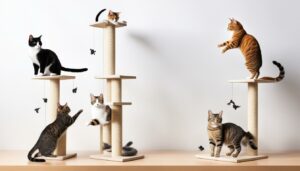Cats are known for their nocturnal nature. As pet owners, we often find ourselves struggling to get a good night’s sleep due to our feline companions’ nighttime activity. But fear not! In this article, I will share with you effective tips on how to reduce your cat’s nighttime activity and create a peaceful evening routine for both of you.

Key Takeaways:
- Understanding cat behavior at night is crucial in finding effective strategies to manage their excessive activity.
- Loneliness, boredom, hunger, old age, and underlying health conditions can contribute to cats being overly active at night.
- Create a stimulating daytime environment for your cat, including interactive playtime and environmental enrichment.
- Establish a consistent evening routine that includes regular feeding times and a calm, low-stress environment.
- Manage your cat’s feeding habits by offering smaller, frequent meals during the day and avoiding late-night meals.
Understanding Cat Behavior at Night
Cats are fascinating creatures, and their behavior at night can sometimes leave owners puzzled. To better understand why cats are more active during the evening and early morning, it’s essential to explore their sleep-wake cycles and their instinctual nature as crepuscular animals.
Cat sleep-wake cycles: Unlike humans and diurnal animals that are active during the day, cats have evolved to be most active during twilight hours. This behavior is rooted in their hunting instincts, as their prey is often active during dawn and dusk. Understanding this natural rhythm helps us develop strategies to manage their nighttime activity.
Crepuscular animals: Cats are considered crepuscular animals, which means they are most active during low-light periods. This behavior is deeply ingrained in their biology, and it’s crucial to respect and accommodate their natural tendencies when considering ways to minimize nighttime activity.
“Cats have a unique relationship with the night. Their innate crepuscular instincts drive their activity during these hours, making it important for owners to find a balance between their cat’s natural behavior and their own sleep needs.”
By understanding the sleep-wake cycles and crepuscular nature of cats, we can approach their nighttime activity with empathy and design strategies to help them adjust to our living patterns while maintaining their overall well-being.
Table: Comparison of Cat and Human Sleep Patterns
| Cats | Humans | |
|---|---|---|
| Typical Sleep Hours | 12-16 hours | 7-9 hours |
| Active Periods | Evening and early morning | Daytime |
| Natural Instincts | Hunting during twilight hours | Daytime activities |
Note: The table compares the typical sleep patterns and instincts of cats and humans, highlighting the differences in sleep hours, active periods, and natural instincts.
Common Reasons for Excessive Nocturnal Behavior
Excessive nocturnal behavior in cats can be frustrating for both owners and their feline companions. Understanding the common causes behind this behavior is key to finding effective solutions. Here are some of the most frequent reasons why cats exhibit heightened activity during the night:
- Loneliness: Cats are often more active at night when they feel lonely or crave attention. If your cat lacks companionship or spends long hours alone during the day, they may seek interaction during the night.
- Boredom: Cats are curious and intelligent creatures that require mental stimulation. When they don’t have enough to keep them engaged during the day, they may become restless and exhibit excessive activity during the night.
- Hunger: Cats have a natural instinct to hunt and may become more active at night if they are hungry. Providing regular, balanced meals throughout the day can help prevent nighttime restlessness caused by hunger.
- Old Age: As cats age, they may experience changes in their sleep patterns and become more active during the night. This can be due to discomfort, cognitive decline, or other age-related factors.
- Health Conditions: Underlying health issues, such as pain, anxiety, hyperthyroidism, or chronic illnesses, can also contribute to excessive nocturnal activity in cats. It’s essential to rule out any medical reasons behind your cat’s behavior.
By identifying the specific cause or combination of factors contributing to your cat’s nighttime activity, you can develop strategies to address the issue and promote a more peaceful sleep routine.
Creating a Stimulating Daytime Environment
Creating a stimulating daytime environment for cats is essential in preventing boredom and reducing nighttime activity. By engaging your cat in interactive playtime and providing environmental enrichment, you can help satisfy their natural instincts and tire them out during the day, promoting relaxation at night.
One effective way to stimulate your cat during the day is through interactive play sessions. Use toys that encourage your cat to chase, pounce, and swat, mimicking the thrill of hunting. This not only provides physical exercise but also engages their mind and helps expend their energy.
Additionally, environmental enrichment can keep your cat mentally stimulated. Provide scratching posts, climbing trees, and safe hiding spots that offer different heights and textures. This allows your cat to engage in natural behaviors and explore their surroundings. Consider rotating toys and introducing new ones periodically to keep their interest piqued.
Remember, each cat is unique, so it may take some trial and error to find the toys and activities that best capture their attention. By creating a stimulating daytime environment, you can help prevent boredom in cats and reduce their nighttime activity, leading to a more peaceful evening for both you and your feline companion.
Establishing a Consistent Evening Routine
Creating a calming nighttime routine is essential for reducing your cat’s nighttime activity. By following a regular evening routine, you can signal to your cat that it’s time to wind down and prepare for sleep. This can significantly contribute to creating a more peaceful and restful environment for both you and your feline companion.
One key aspect of an evening routine for cats is maintaining a regular feeding schedule. Try to feed your cat at the same time each evening to establish a sense of structure and predictability. By providing a satisfying meal before bedtime, you’ll help ensure that your cat isn’t hungry during the night, minimizing any motivation for nighttime activity.
In addition to mealtime, interactive play sessions can play a crucial role in promoting relaxation. Engaging your cat in active play before bed can help them expend energy and reduce restlessness. Use toys that encourage movement and play, allowing your cat to engage in natural hunting behaviors. This physical stimulation will tire them out and prepare them for a restful night’s sleep.
Creating a low-stress environment is another critical element of a calming nighttime routine. Keep the area where your cat sleeps free from loud noises, disruptions, and bright lights. Consider using calming pheromone diffusers or soft background music to create a soothing atmosphere. Providing a comfortable bed with soft bedding in a separate sleeping area can also contribute to a serene sleeping environment for your cat.
Table: Sample Evening Routine for Cats
| Time | Activity |
|---|---|
| 6:00 PM | Interactive playtime with toys |
| 6:30 PM | Feeding time |
| 7:00 PM | Quiet time in a separate sleeping area |
| 8:00 PM | Dim the lights and provide soft background music |
Remember, establishing a consistent evening routine may take time and patience. Cats are creatures of habit, and it may take a few weeks for them to adjust to the new routine. Stick to the schedule and remain consistent in your approach, and soon you’ll notice a positive change in your cat’s nighttime behavior. A relaxing evening routine will not only benefit your cat but also enhance your own sleep quality, creating a more harmonious living environment for everyone in the household.
Managing Feeding Habits
Controlling your cat’s feeding habits can play a significant role in reducing nighttime activity. Establishing a consistent feeding schedule can help prevent nighttime feeding and discourage your cat from becoming restless during the night. Consider offering smaller, frequent meals throughout the day to keep your cat satiated and satisfied.
One helpful tool in managing feeding habits is automatic feeders. These devices can be programmed to dispense food at specific times, allowing you to regulate your cat’s meal schedule even when you’re not at home. By using automatic feeders, you can ensure that your cat receives their meals at appropriate times, minimizing the temptation for late-night snacking.
Controlling hunger is also crucial in managing your cat’s nighttime activity. If your cat tends to become hungry during the night, try providing a light meal or snack before bed. This can help fulfill their nutritional needs and reduce the likelihood of them seeking food during the night. However, it’s important to avoid offering large, heavy meals late at night, as this may disrupt their digestion and lead to discomfort.
| Methods for Managing Feeding Habits | Benefits |
|---|---|
| Establishing a consistent feeding schedule | Helps prevent nighttime feeding and establishes routine |
| Using automatic feeders | Allows for regulated meal times, even when you’re not at home |
| Providing a light meal or snack before bed | Helps control hunger and reduces the likelihood of late-night snacking |
Remember that each cat is unique, and it may take some trial and error to find the feeding schedule and routine that works best for your furry friend. By managing your cat’s feeding habits effectively, you can support a peaceful and restful night’s sleep for both you and your cat.
Promoting Physical and Mental Stimulation
Providing ample physical and mental stimulation for your cat is essential in reducing nighttime activity and promoting a more peaceful evening routine. Cats have natural instincts to explore, hunt, and play, so engaging them in activities that stimulate their bodies and minds can help tire them out and promote relaxation during the night.
One effective way to physically stimulate your cat is through interactive playtime. Use toys that encourage active play, such as feather wands, laser pointers, or interactive chasing toys. Engage your cat in play sessions before bedtime to help expend their energy. This not only provides physical exercise but also mimics their instinctual hunting behavior, satisfying their natural instincts.
Mental stimulation is equally important for keeping your cat engaged and reducing nighttime activity. Use puzzle feeders to provide mental challenges during mealtime. These feeders require your cat to work for their food, keeping them mentally stimulated and entertained. You can also rotate their toys regularly to keep them interested and engaged.
Remember that each cat is unique, so it may take some trial and error to find the activities that your cat enjoys the most. Observe their preferences and adjust the stimulation techniques accordingly. Whether it’s interactive play, puzzle feeders, or a combination of both, finding the right balance of physical and mental stimulation will help promote a more restful night’s sleep for your feline companion.
Creating a Calm Sleeping Environment
Creating a calm sleeping environment for your cat is essential in promoting restful sleep. Cats are sensitive to their surroundings, and a peaceful sleeping area can help them feel safe and secure. Here are some tips for creating a comfortable sleep area for your feline companion:
Separate Sleeping Space
Provide your cat with a separate sleeping space that is exclusively theirs. This can be a cozy cat bed, a soft blanket, or even a dedicated cat tree with comfortable perches. Having their own space will allow them to relax and unwind without any disturbances.
Minimizing Disturbances
Cats can be easily startled or disturbed by loud noises, bright lights, or sudden movements. Keep your cat’s sleeping area away from noisy appliances, such as washing machines or television sets. Close the curtains or shades to minimize outside light disturbances. Additionally, ensure that the sleeping area is in a quiet part of the house where they won’t be disturbed by foot traffic or other pets.
Soundproofing
If your cat is particularly sensitive to noise, consider soundproofing their sleeping area. Use thick curtains or sound-dampening materials to reduce noise from outside. You can also play calming music or use a white noise machine to create a soothing auditory environment for your cat.
Soft Bedding
Provide your cat with soft and comfortable bedding for their sleeping area. Opt for plush blankets or beds with cozy cushions to create a cozy and inviting space. Some cats may prefer heated beds or pads, especially during colder months, to help keep them warm and snug.
By creating a calm sleeping environment for your cat, you can help them relax and get a good night’s sleep. Remember to regularly clean their sleeping area and replace any worn-out bedding to ensure optimal comfort. With a comfortable sleep area, your cat will be more likely to settle down and have a peaceful night’s sleep.
Veterinary Assistance for Managing Cat Nighttime Activity
Seeking veterinary assistance is important when dealing with persistent nighttime activity in cats. While some level of nocturnal behavior is natural for cats, excessive activity during the night can be a cause for concern. A veterinarian can help assess your cat’s overall health and provide valuable advice on managing their behavior.
If your cat’s nighttime activity continues despite implementing various strategies, it may be necessary to explore potential underlying health issues. Cats experiencing pain, anxiety, or chronic illness may exhibit increased activity during the night. A veterinarian can conduct a thorough examination and recommend appropriate medication or treatment options to address these conditions.
Common Health Issues in Cats
Cats can be susceptible to various health issues that can impact their behavior and activity levels. Some common health conditions that may contribute to excessive nighttime activity include:
- Hyperthyroidism: A condition characterized by an overactive thyroid gland, which can lead to increased energy levels and restlessness in cats.
- Pain or Discomfort: Cats experiencing pain, such as arthritis or dental issues, may display nocturnal activity as they try to find a comfortable position.
- Anxiety or Stress: Cats prone to anxiety or experiencing stressful situations may exhibit increased activity during the night.
Consulting a veterinarian can help identify and manage these underlying health conditions, contributing to a more peaceful nighttime routine for your cat.
| Why Seek Veterinary Assistance? | Benefits of Veterinary Advice |
|---|---|
| Identify underlying health conditions | Effective medication or treatment options |
| Expert assessment of overall health | Professional guidance tailored to your cat’s needs |
| Address behavior and activity concerns | Improved quality of life for your cat |
Patience and Persistence
Managing and reducing nighttime activity in cats requires patience and persistence. As a cat owner, I understand the frustration and sleepless nights that excessive nocturnal behavior can cause. However, it’s important to remember that finding long-term solutions takes time and a consistent approach.
Each cat is unique, and what works for one may not work for another. It’s essential to adapt your techniques to suit your cat’s individual needs. Be patient in your approach, knowing that it may take some trial and error to find the most effective strategies. Consistency is key. Stick to the routines and methods you’ve established, and give your cat time to adjust.
Remember, managing cat behavior is a journey, not an overnight fix. Celebrate small victories along the way and stay committed to creating a peaceful nighttime routine. With dedication and persistence, you can help your cat feel more relaxed and reduce their nighttime activity, ultimately improving both of your sleep patterns.







